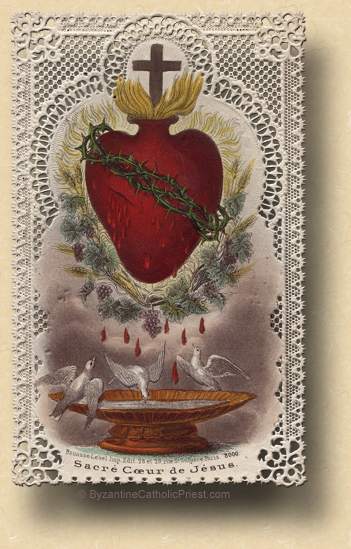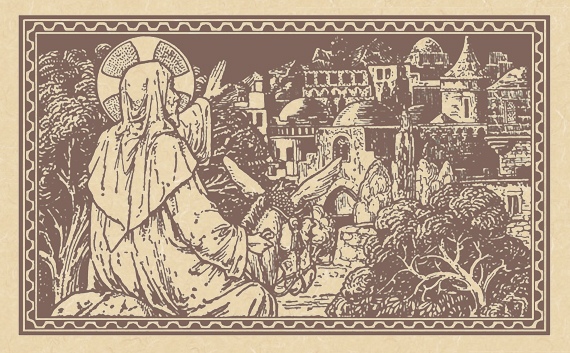You Don't Have to Be Bipolar to Read the Bible … But It Helps.
The Thirtieth Thursday of Ordinary Time.
Lessons from the primary feria, according to the ordinary form of the Roman Rite:
• Romans 8: 31-39.
• Psalm 109: 21-22, 26-27, 30-31.
• Luke 13: 31-35.
The Twenty-Second Thursday after Pentecost.
Lessons from the dominica,* according to the extraordinary form of the Roman Rite:
• Philippians 1: 6-11.
• Psalm 132: 1-2.
• Matthew 22: 15-21.
The Twenty-Second Thursday after Pentecost; the Feast of the Holy Venerable Martyr Anastasia; the Feast of Our Venerable Father Abraham the Hermit; and, the Remembrance of the Passing of Our Venerable Father Abraham of Rostov, Archimandrite & Wonder-Worker.**
Lessons from the pentecostarion, according to the Ruthenian recension of the Byzantine Rite:
• I Thessalonians 2: 9-14.
• Luke 11: 14-23.
FatherVenditti.com
|
 1:31 PM 10/29/2015 — Just some very brief remarks for today. 1:31 PM 10/29/2015 — Just some very brief remarks for today.
We haven't been talking about the Epistle to the Romans these past couple of weeks, even though the Missal has given us ample opportunity to do so; and, as we forge ahead toward the Feast of All Saints and, ultimately, Christ the King and the end of Ordinary Time, the Missal shows us its grounding in an appreciation for the human condition, but at the same time sets up a rather lofty goal: maintaining our confidence in the face of total failure from a purely human perspective.
All too often we feel like the Psalmist in today's responsorial: “… in your great mercy rescue me. For I am poor and needy; my heart is pierced within me. … Help me, Lord, my God; save me in your mercy” (109: 21-22, 26 NABRE); yet, the Blessed Apostle Paul, on trial in Rome for treason, knowing that he'll soon be going to his death, exhorts the Christians in Rome—and us—to hold fast, declaring, “If God is for us, who can be against us? He who did not spare his own Son but handed him over for us all, how will he not also give us everything else along with him? (Rom. 8: 31-32 NABRE).
It's not bipolar. This tension between despair and hope is one of the most common themes in all Scripture. “Jerusalem, Jerusalem,” our Lord says today, “you who kill the prophets and stone those sent to you, how many times I yearned to gather your children together as a hen gathers her brood under her wings, but you were unwilling!” (Luke 13: 34 NABRE). Our despair is of our own making. Our doubts about the final triumph of Christ the King is fueled by our own failure to cultivate that forgotten virtue of Hope. Even contemplating the victories of the saints, whose dedication to the Gospel caused them to suffer as our Lord did as a means to entering into heavenly glory, eludes us as we wallow in our own self-pity.
Our Lord Himself ends today's Gospel lesson by quoting another Psalm: “Blessed is he who comes in the name of the Lord” (118: 26 NABRE). But we know a lot of water has to flow under the bridge before we can sing that Psalm along with Him: before the triumph must come the battle; before the resurrection must come the passion. That's why the Feast of All Saints precedes the Feast of Christ the King: because Christ doesn't reign until He first suffers, and we don't rejoice by the empty tomb until we have stood at the foot of the Cross. That's why we're not absolved from our sins until we first kneel before Him and confess them.
At a weekday Mass I typically will skip the optional verse before the Gospel, but not today: Benedictus qui venit rex in nómine Dómini; pax in cælo et glória in excélsis—“Blessed is the king who comes in the name of the Lord … peace to those on whom his favor rests” (cf. Luke 19: 38; 2: 14 RM3). And His favor will rest on each of us so long as we continue to increase in the virtue of Hope; and, we do that by enveloping ourselves in His Grace through seeking the expiation for our sins in confession, and staying ever close to His Sacred Heart in the Most Blessed Sacrament.

* In the extraordinary form, on ferias outside of privileged seasons, the lessons from the preceding Sunday are repeated.
** The Typicon of the Ruthenian recension contains occasional commemorations of the passing of some individuals of holy life who have not been formally canonized or beatified and which do not appear in other calendars of the Byzantine Rite; Abraham of Rostov is one of these. No texts for these figure in the liturgy of the day.
A note on the title "archimandrite": personal experience indicates that the customs surrounding how priests are sometimes honored in the Churches of the Byzantine Tradition is one of the most commonly misunderstood aspects of Eastern Christianity by their confreres in the West; to wit, Roman Catholics will assume that a priest who is called an “arch-priest” or an “archimandrite” is some sort of abbot or dean. In reality, these are purely honorary titles which correspond to the title “monsignor” in the Latin Church, with the important difference that they are conferred by the local bishop only, and not by the Holy Father. Like the title “monsignor,” there is no job or office that goes along with them. The bishop bestows these titles on whomever he wishes, for whatever reason he wishes, and there is no requirement that the priest so honored be given any particular assignment or authority.
If the bishop is honoring a secular priest, he grants the title arch-priest, of which there are three ranks; if honoring a religious priest, he grants the title archimandrite. Oddly enough, in the case of an archimandrite, the honor is bestowed by the local bishop, and not by the priest's own religious superiors, sometimes without even consulting them, a remnant of the traditional tension that has always existed between the monasteries and the secular hierarchy in the Churches of Orthodoxy. In the Eastern Churches in union with Rome, the Code of Canons of the Eastern Churches provides more precise rules governing the relationship between the bishop and the montasteries within his territory.
|

